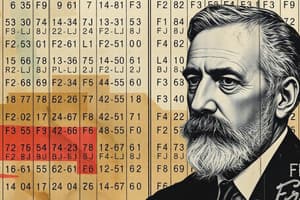Podcast
Questions and Answers
What are the six components of a useful theory?
What are the six components of a useful theory?
- Being falsifiable, generating research, organizing data, guiding action, being internally consistent, and parsimonious (correct)
- Being descriptive, generating research, organizing data, guiding action, being internally consistent, and parsimonious
- Being falsifiable, generating research, organizing data, guiding action, being externally consistent, and parsimonious
- Being falsifiable, generating research, organizing data, guiding reaction, being internally consistent, and parsimonious
What is the difference between a hypothesis and a theory?
What is the difference between a hypothesis and a theory?
- A hypothesis is an educated guess or prediction, while a theory is a set of related assumptions that allow scientists to use logical deductive reasoning to formulate testable hypotheses. (correct)
- A hypothesis is a set of related assumptions that allow scientists to use logical inductive reasoning to formulate testable hypotheses, while a theory is an educated guess or prediction.
- A hypothesis is an educated guess or prediction, while a theory is a set of related assumptions that allow scientists to use logical inductive reasoning to formulate testable hypotheses.
- A hypothesis is a set of related assumptions that allow scientists to use logical deductive reasoning to formulate testable hypotheses, while a theory is an educated guess or prediction.
What are the three parts of Freud's theory of the unconscious?
What are the three parts of Freud's theory of the unconscious?
- Ego, superego, and consciousness
- Consciousness, unconsciousness, and preconsciousness
- Preconsciousness, ego, and superego
- Id, ego, and superego (correct)
What is the focus of Kleinian therapy?
What is the focus of Kleinian therapy?
What is Erikson's idea of pseudospeciation?
What is Erikson's idea of pseudospeciation?
What are the differences between malignant narcissism, necrophilic orientation, and incestuous symbiosis according to Fromm?
What are the differences between malignant narcissism, necrophilic orientation, and incestuous symbiosis according to Fromm?
What are Maslow's physiological needs?
What are Maslow's physiological needs?
What is the Jonah complex?
What is the Jonah complex?
What are the six components of a useful theory?
What are the six components of a useful theory?
What is a hypothesis?
What is a hypothesis?
What are the three components of Freud's theory of the unconscious?
What are the three components of Freud's theory of the unconscious?
What is Adler's idea of the safeguarding tendency?
What is Adler's idea of the safeguarding tendency?
What is Jung's theory of the collective unconscious?
What is Jung's theory of the collective unconscious?
What is Horney's idea on the defenses against anxiety?
What is Horney's idea on the defenses against anxiety?
What are Erikson's developmental stages?
What are Erikson's developmental stages?
What is Maslow's Jonah complex?
What is Maslow's Jonah complex?
Flashcards are hidden until you start studying
Study Notes
Summary of Key Concepts in Personality Theories
- Chapter One outlines the six components of a useful theory, including generating research, being falsifiable, organizing data, guiding action, being internally consistent, and parsimonious.
- The chapter also defines a hypothesis as an educated guess or prediction and a theory as a set of related assumptions that allow scientists to use logical deductive reasoning to formulate testable hypotheses.
- Chapter Two explores Freud's theory of the unconscious, including the id, ego, and superego, as well as different types of anxiety and defense mechanisms.
- The chapter also discusses psychological maturity and Freudian dream interpretation.
- Chapter Three delves into Adler's ideas of the routes people strive for, the final goal, the striving force as compensation, the neglected style of life, the safeguarding tendency, and early recollections technique.
- Chapter Four focuses on Jung's theory of the collective unconscious, different types of archetypes, and the two basic attitudes and four separate functions.
- The chapter also discusses the focus of Jungian dream interpretation.
- Chapter Five explores Kleinian therapy's focus on transference, counter-transference, and unconscious phantasy, as well as how a unified ego emerges.
- The chapter also discusses Klein's ideas of psychic defense mechanisms.
- Chapter Six examines Western society's impact on love, what inhibits a child's healthy development, and Horney's idea on the defenses against anxiety.
- The chapter also discusses the differences between moving away, towards, and against people and the tyranny of the should.
- Chapter Seven outlines Erikson's developmental stages, the differences between the play and school ages as well as adolescence, and what integrity is.
- The chapter also discusses Erikson's idea of pseudospeciation.
- Chapter Eight explores Fromm's breaking the cycle of conformity and powerlessness and how healthy people value work.
- The chapter also discusses the differences between malignant narcissism, necrophilic orientation, and incestuous symbiosis.
- Chapter Nine delves into Maslow's physiological needs and how they differ from his other needs, as well as instinctoid needs vs. noninstinctoid needs and B-values.
- The chapter also discusses the Jonah complex, which is the fear of being one's best.
Studying That Suits You
Use AI to generate personalized quizzes and flashcards to suit your learning preferences.




